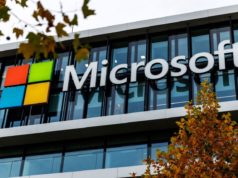The company at an event late Wednesday announced “Project Evo,” a collaboration with chipmaker Intel to bring new capabilities to personal computers, including microphones capable of picking up commands spoken from across a room as well as advanced biometric security features.
A coming slate of virtual reality and augmented reality headsets powered by Windows PCs and built by a range of hardware makers, meanwhile, will be available for developers beginning at a game developers conference that kicks off in February.
The announcements, timed for Thursday morning in China, kicked off the company’s WinHec event in Shenzhen, a forum where the company tells hardware makers about coming Windows features so they can take advantage of new capabilities.
The conference, formerly the Windows Hardware Engineering Conference, was held annually in the U.S. until a hiatus that began in 2008. It was resurrected in 2015 and moved to China, following the center of gravity of the computer manufacturing industry.
Absent from Microsoft’s prepared announcements was any reference to smartphones, a weak point for a company that remains bound in many ways to the PC.
After failing to break into the Apple- and Google-dominated mobile market with its disastrous acquisition of Nokia, Microsoft has pushed to extend the life of its wheelhouse, the personal computer.
PC demand has been shrinking for years as consumers go longer between replacing computers and favor mobile devices. Analysts with Gartner predict a further decline in PC unit sales of 8 percent in 2016.
Microsoft has tried to breathe life into the market, first with its Surface two-in-one laptop line, and most recently with the Surface Studio all-in-one touchscreen PC introduced last month.
The company on Wednesday announced some steps to give Windows PCs smartphone-like functions.
Microsoft plans to add support for eSim cellular connectivity in Windows desktops.
Separately, the company said it will work with Qualcomm, the mobile chip maker, to build a version of the Windows 10 desktop variant that works on devices powered by processors with the ARM architecture.
An emulator will allow such devices to run existing Windows applications built on Win32, the main programming interface for Windows, as well as programs designed under the universal Windows platform built into Windows 10.
© 2016 Seattle Times
syndicated under contract with NewsEdge. -.







